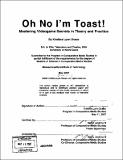| dc.contributor.advisor | Henry Jenkins, III. | en_US |
| dc.contributor.author | Drzaic, Kristina Lynn | en_US |
| dc.contributor.other | Massachusetts Institute of Technology. Dept. of Comparative Media Studies. | en_US |
| dc.date.accessioned | 2009-01-30T18:33:42Z | |
| dc.date.available | 2009-01-30T18:33:42Z | |
| dc.date.copyright | 2007 | en_US |
| dc.date.issued | 2007 | en_US |
| dc.identifier.uri | http://dspace.mit.edu/handle/1721.1/39156 | en_US |
| dc.identifier.uri | http://hdl.handle.net/1721.1/39156 | |
| dc.description | Thesis (S.M.)--Massachusetts Institute of Technology, Dept. of Comparative Media Studies, 2007. | en_US |
| dc.description | Includes bibliographical references (p. 86-89). | en_US |
| dc.description.abstract | Secrets are a ubiquitous part of contemporary videogame design, yet are largely unexplored within academic discourse and often dismissed as extras. I contend that secrets play a fundamental and influential role within a given gamespace in terms of the way they affect a videogame design and player experience. As such this paper will investigate the nature of secrets in videogames. I shall find where secrets exist in a game and how they function as moments of gameplay. Then I will explore secrets historically and look at how the meaning of secrets have changed and evolved over time. It will be shown that secrets create a window to an underlying structure of gameplay, a meta-level that subverts the regular play of a videogame. Further, I will argue that secrets are a space where players engage in unstructured play, free from the constraints of a game design. Finally I will demonstrate how secrets can be used to personalize or redesign the experience of a videogame and/or remake the game design itself. In order to make this argument I will break down what secrets can mean specifically to players through two very differently structured games: The Legend of Zelda: Ocarina of Time and Animal Crossing. Knowing why secrets matter in a gamespace will reveal a reason for why videogames are compelling as a brave new form of media. | en_US |
| dc.description.statementofresponsibility | by Kristina Lynn Drzaic. | en_US |
| dc.format.extent | 91 p. | en_US |
| dc.language.iso | eng | en_US |
| dc.publisher | Massachusetts Institute of Technology | en_US |
| dc.rights | M.I.T. theses are protected by
copyright. They may be viewed from this source for any purpose, but
reproduction or distribution in any format is prohibited without written
permission. See provided URL for inquiries about permission. | en_US |
| dc.rights.uri | http://dspace.mit.edu/handle/1721.1/39156 | en_US |
| dc.rights.uri | http://dspace.mit.edu/handle/1721.1/7582 | en_US |
| dc.subject | Comparative Media Studies. | en_US |
| dc.title | Oh no I'm toast! : mastering videogame secrets in theory and practice | en_US |
| dc.title.alternative | Mastering videogame secrets in theory and practice | en_US |
| dc.type | Thesis | en_US |
| dc.description.degree | S.M. | en_US |
| dc.identifier.oclc | 166228936 | en_US |
